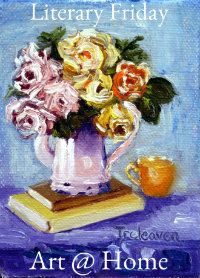When reading the jacket flap on this book it seems to be a sweet memoir of a mother and son and their life together as seen through the scope of all the many books they had read throughout their lives and especially the ones they choose to read near the end of the mother's life.
And for all intents and purposes it really is a love story from a son to his mother.
Here's a review from someone who, for whatever reason, kept getting sidetracked by the issues in the book other than what it seems to be about on the surface.
Mary Anne Schwalbe, Bill's mother, was diagnosed with pancreatic cancer in 2007. They have always shared a love of books and reading and often times they traded and passed books to each other and then discussed ideas and themes and characters they read about. The books they would read after her diagnosis were much the same...read, pass, discuss.
I think it's beautiful how they were able to come together and have this memorable time discussing important issues.
A lot of the stories in the books they read were seen through the scope of their lives and Mary Anne's work with Women's organizations and also in Afghanistan.
I think it's safe to say that the Schwalbe family is a wealthy family from the North East. Cerebral, academic and very involved in their community.
They definitely see the world differently than a woman like myself who neither comes from wealth nor has traveled much.
The book was very much about books they read and how they brought them together to discuss important issues.
However, I kept getting side tracked by things that I thought were out of place in the book. Of course I am aware that I don't have an insiders point of view and who am I to say what was appropriate in someone else's memoir?? I take full responsibility for my opinions and digression here.
It's almost as if because they are wealthy that Mary Anne felt guilty about it. She felt guilty that she had such wonderful health care that let her take advantage of the best treatments in the world and gave her 2 years of life with her family that she may not have had without it.
She felt guilty about getting blood transfusions. Although Schwalbe was quick to point out that she had donated many pints of blood over her lifetime so that did assuage her guilt some...she had taken but she had given so that evened it out. She also had guilt over the prescriptions she was able to take.
The author felt as though the election of Barack Obama was tied to whether or not his mother would would do well in treatment and with her current scans of the tumors at the time. It was a superstition thing, in a way.
He was very keen on telling about Mary Anne's desire to let everyone know that Obama MUST be elected so that health care reform could take place. Then everyone would have the same kind of care that she was able to have.
Mary Anne was a Christian woman who wanted her son to come to Christianity, or "religion" as Schwalbe refers to it. The one book that she had chosen for part of their impromptu book club that was "religious", Schwalbe never did read. He doesn't believe and at the end of the book I was sad that he didn't become at least more open to the idea of God.
This review is all over the place, I can't seem to get it all out in a succinct post.
Maybe I'll close it up with some bullet points:
* The book was more political than I would have liked.
* The constant need to reiterate the guilt associated with the kind of lifestyle they lead was annoying.
* Mary Anne Schwalbe was a strong woman who loved her family and the organizations she founded and managed.
* The way the author sort of poo-poohed her Christian philosophy irritated me.
* They read a LOT of books and there is a bibliography in the back that I'm taking full advantage of.
* I don't think they ever read a fluff book. No Stephanie Plum there.
* I am not smart enough to be in their book club.
* I would have liked to meet Mary Anne.
* I wouldn't like to meet Schwalbe.
* The book almost had to be political in a way because of the life they lead and where Mary Anne's focus lay with Women's organizations, Afghanistan, etc. Every book they read was obviously going to be discussed with whatever experiences they had that they brought with them.
* You should read it if for no other reason than to see how the "other side" live and to get an idea of why they think they way they do. I found that very telling.
* That's the end of my review.
You are welcome! No more rambling.
What did everyone else think? Maybe I should read it again to see if I can get past the rabbit trails that my brain kept taking?



































